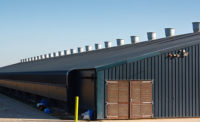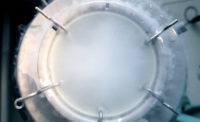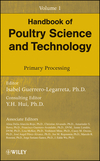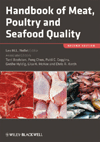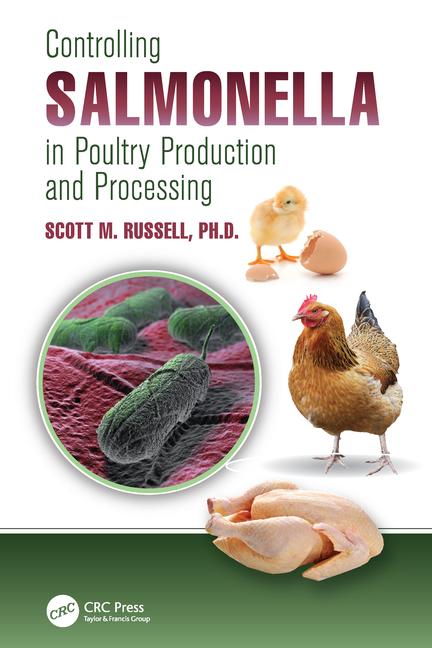Farm to Plate
Researching the use of probiotics in live poultry
Research from Oklahoma State’s FAPC uses wheat-sourced probiotics to produce healthier chicken.

FAPC’s research team includes (from left to right) Alejandro Penaloza, visiting assistant professor; Zorba Hernandez, postdoctoral visiting scientist; and Patricia Rayas, FAPC cereal chemist.
Sales of probiotic-fed chicken products in the United States have increased 34 percent in the last year due to the demand for antibiotic-free poultry.
According to the U.S. Department of Agriculture (USDA), Tyson Foods, the country’s largest processor of chicken, announced it would use probiotic-fed chickens in its operations by September 2017.
Because of this trend, researchers at Oklahoma State University’s Robert M. Kerr Food and Agricultural Products Center, a part of the Division of Agricultural Sciences and Natural Resources, are studying the implementation of probiotics in chicken feed.
“The reason for the study was to help the food industry produce a healthier bird,” says Patricia Rayas, FAPC cereal chemist. “When the probiotics are ingested, they try to outweigh the bad bacteria.”
Garnering results
Rayas, along with Alejandro Penaloza, visiting assistant professor, and Zorba Hernandez, postdoctoral visiting scientist, began studying probiotics in November 2014. Other members of the team were graduate students Sabitri Gautam, Sudhir Pasupuleti, Thiago Montaigner Souza and Pryscila Velazco, and Ali Beker, poultry senior research specialist for OSU’s department of animal science.
The research team received 300 broiler chickens, which were housed at the OSU poultry farm for 42 days. The broilers were split into four test groups to try different preparations of probiotics.
The team fed probiotics as a supplement in the chickens’ diet by using a mixture of probiotic strains created by Penaloza and a standard feed diet.
Probiotics are used to boost the immune system and serve the microbiota in defending bacteria.
“Our hypothesis was that the probiotics would improve the community of microbes in the gut of the broiler,” Rayas says. “The broilers were then fed the probiotics two different ways — mixed in the feed and liquid administration.”
The final step of the study was to process the chickens in FAPC’s processing facility. Data was collected to calculate feed efficiency, and ground samples of the broilers were taken to the Cereal Chemistry Laboratory for further research.
Results showed in the first two weeks the broilers that were fed probiotics had an increased weight gain and lower death rate. When a broiler gains weight, it gains muscle mass and produces more food, which in return increases potential profit and quantity.
“When the main objective is reached, the isolated probiotics may be useful for the poultry to produce chicken that is free of antibiotics and better-feed efficiency,” Hernandez says.
Research has shown probiotics give broilers protection for intestinal integrity and help defend the immune system from unwanted bacteria.
Finding the probiotic strains
FAPC’s Cereal Chemistry Laboratory housed the collection of the probiotic strains, which was sourced from wheat. Penaloza isolated the strains from wheat and selected those with high production of exoenzymes.
“The advantage of using these strains of probiotics is that it helps improve the use of nutrients in the feed,” Penaloza says. “The strains also will stabilize the microorganisms in the gut of the broilers.”
Hard wheat, flour and water were fermented to enrich the microorganism’s spores, Penaloza said.
The strains of probiotics were then isolated, selecting those with high production of enzymes of interest. The strains were placed under intense heat to ensure it would survive when cooking the food pellet.
The research team is working with OSU’s Technology Development Center (TDC) to patent mixtures of probiotic strains for particular uses. TDC, which helps with the development of new products, the integration of new technology and the increase of capital investments, also funded this research.
Conducting future research
Hernandez says further research is needed to evaluate other strains of probiotics and acquire more knowledge to measure the benefits of using probiotics in the poultry industry.
“This research can bring health benefits to chickens and people by maintaining healthy microbial community in the intestine of the chickens,” he says. “This would maintain healthier chickens and reduce the use of antibiotics. Additionally, the use of probiotics also can generate ecological benefits and increase the efficiency of feed conversion of the broilers.”
Rayas says the team has high hopes for future research projects.
“Our hypothesis for the next research project is to use a spore-based probiotic that supports the balance of the micro ecology by simulating the colonization of beneficial bacteria,” she says. “This will improve the broilers’ intestinal health and enhance growth performance. In the future we hope to create a mixture so the industry can maintain a healthier intestine for the chickens.”
The ultimate goal is to help the poultry industry continue to provide a safe product to its consumers. NP
Oklahoma State University is a modern land-grant university that prepares students for success. OSU has more than 36,000 students across its five-campus system and more than 25,000 on its combined Stillwater and Tulsa campuses, with students from all 50 states and around 120 nations. Established in 1890, Oklahoma State has graduated more than 260,000 students who have been serving Oklahoma and the world for 125 years.
Definitions:
Micro ecology: ecology of a system of microorganisms in the intestine
Microbiota: community of microbe that live in the intestine
Microorganism spore: the resistant stage of bacteria
Probiotics: a preparation — such as a dietary supplement containing live bacteria — that is taken orally to restore beneficial bacteria to the body; a bacterium of such a preparation
Looking for a reprint of this article?
From high-res PDFs to custom plaques, order your copy today!



